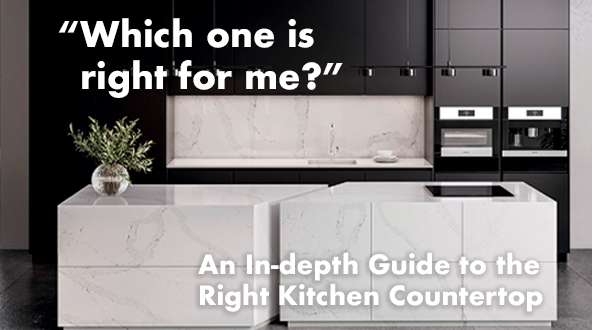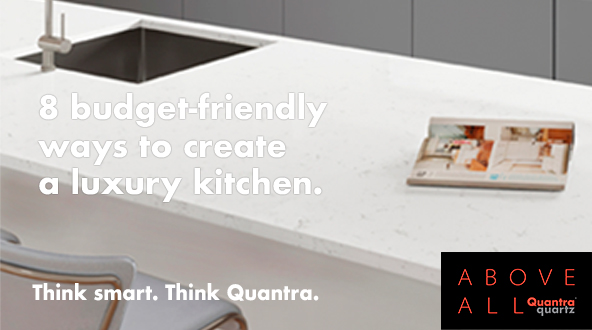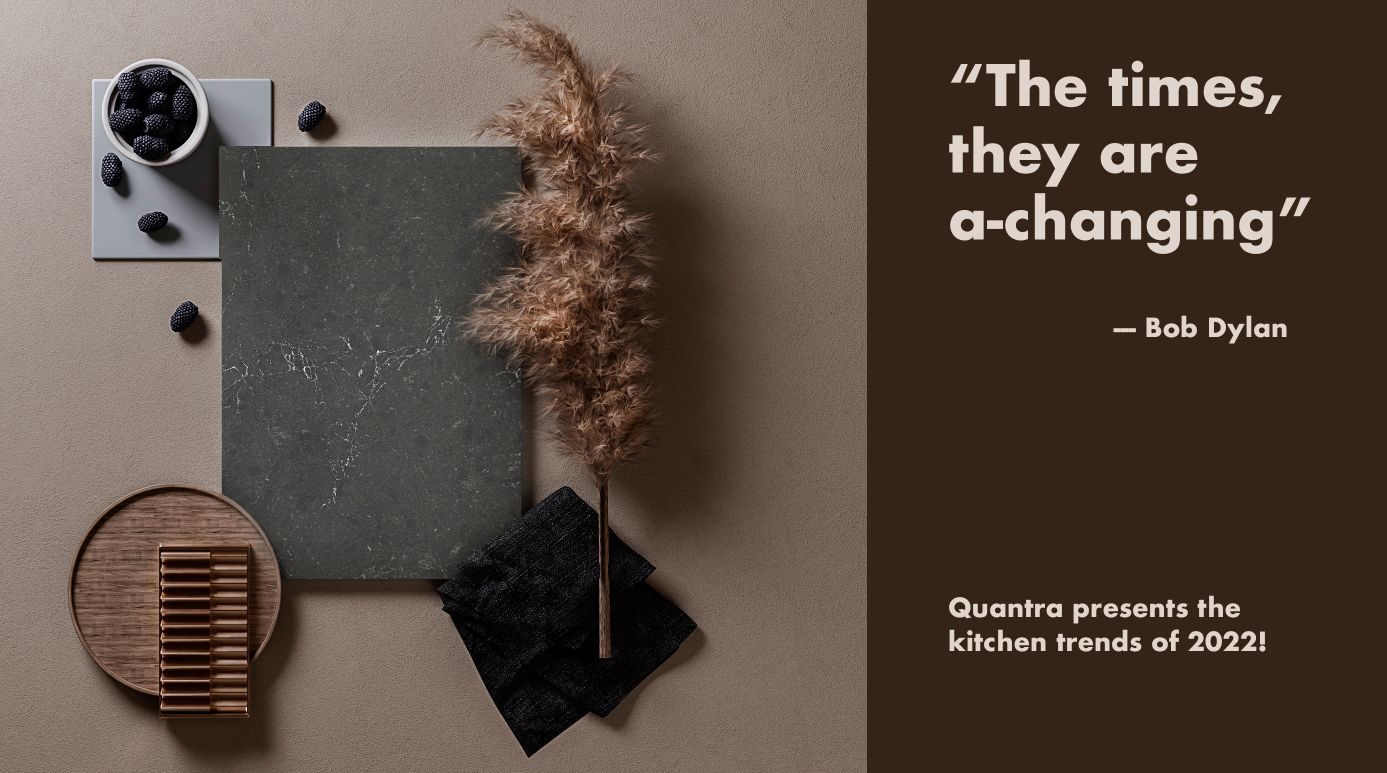Best Materials for Kitchen Countertops
Jun, 2021 | All,
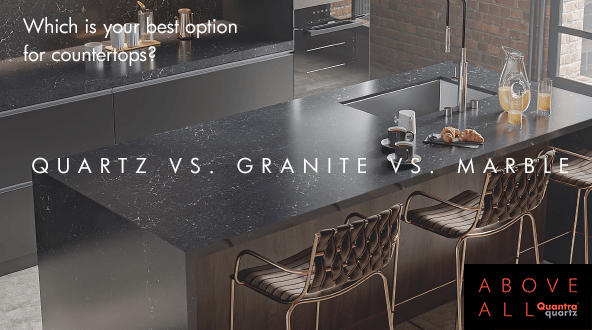
Confused about the dizzying array of countertop choices? For a long time, natural stone was the hot favorite for kitchen and bathroom surfaces. But the popularity of engineered quartz has soared; thanks to its versatility. So when it comes to quartz vs. granite vs. marble, which one is right for you? Let’s take a look at the pros and cons of each.
Pros and cons of granite countertops
Granite has long been considered the benchmark by which all other countertop materials have been measured. Mined from natural stone, each slab makes a unique and eye-catching centerpiece.
Benefits of granite countertops
Individuality
No two slabs of granite are the same. And, with a variety of colors to choose from, the creative possibilities for making a statement are many.
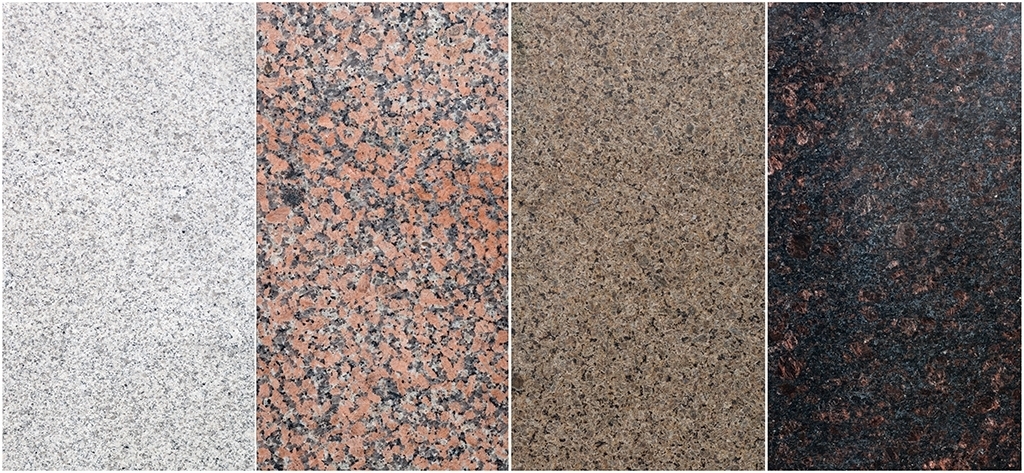
Durability
Granite’s reputation for durability is down to its construction as an igneous rock, rich in the minerals quartz and feldspar, which score highly on the Mohs Scale for hardness. It’s scratch-resistant and can withstand extreme temperatures.
Cons of granite countertops
Pattern-matching
Granite’s beautiful quirks make it impossible to match slab ‘patterns’ together on installation. If continuity is important to you, granite might not be your best choice of countertop.
Damage
The composite nature of granite means that it is susceptible to chipping and cracking, and repair can be a costly business.
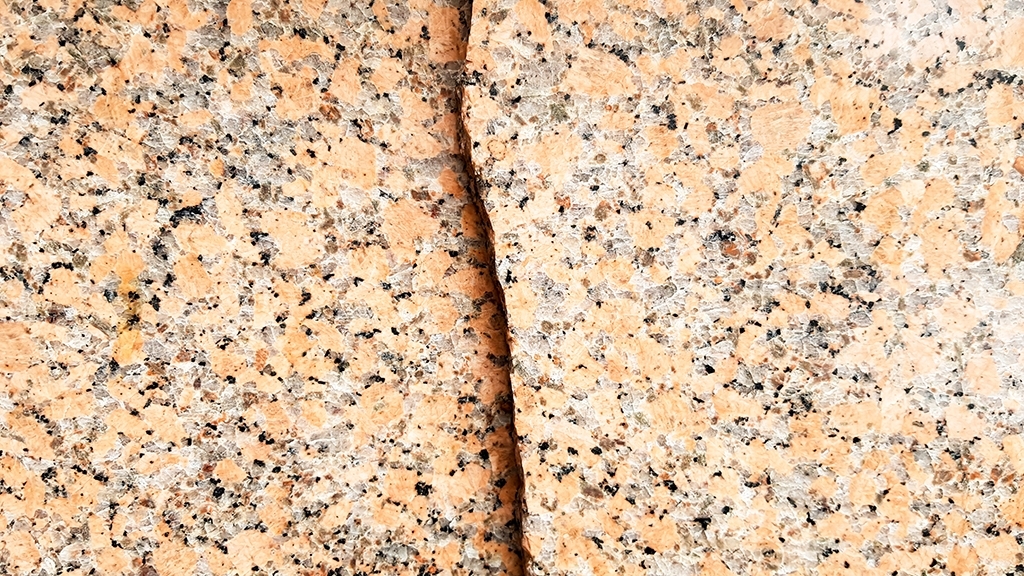
Stains
Being porous, granite absorbs liquids, which may result in staining. For this reason, it’s important to reseal the surface every 2-5 years. But even the highest-quality sealant will absorb liquid over time, so it’s important to wipe up any spills.

Hygiene
Granite’s porosity also means that it can harbor mold, mildew, viruses, and bacteria if the surface sealant is not well maintained.
Granite countertops cost
Materials and professional installation: $20 and $200 per square foot.
Maintenance costs: High
Pros and cons of marble countertops
Marble historically symbolized wealth and power throughout the world, most notably in ancient Greece and the Roman empire. Today, it’s still synonymous with luxury and considered timeless.
Benefits of marble countertops
Distinctiveness
Like granite, marble’s charm lies in its natural imperfections, variety of colors, and inherent uniqueness. Its one-of-a-kind nature injects individuality into residential and commercial projects.
Cons of marble countertops
Pattern-matching
As with granite, each marble slab has a unique vein pattern and shade, making joins in your countertop more obvious than they would be with engineered materials that can be pattern and color-matched.
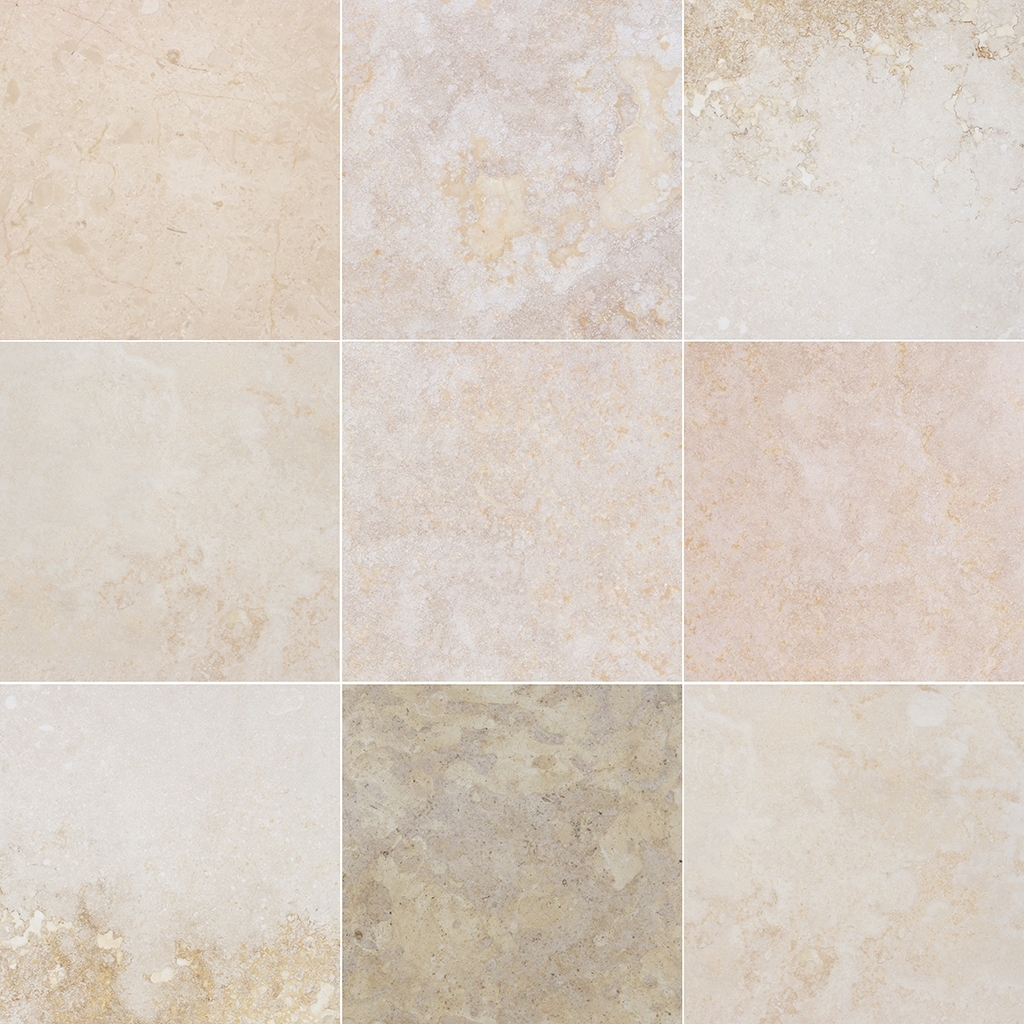
Sealing
Due to its high level of porosity, marble requires a more regimented approach to resealing. It should be coated at least a few times per year to help make the surface less permeable to liquid and prevent staining.
Durability
Marble is a softer stone than granite, making it less durable and scratch-resistant. Sharp knives will cause scars, and dropping a pan or plate is likely to chip the surface or even cause a corner to break off.
Warranty
Some manufacturers won’t warranty marble countertops if they are installed in a kitchen due to the high level of customer complaints about staining, chipping, and cracking. Installers often refuse to fit them for the same reason.
Marble countertops cost
Materials and professional installation: $40 – $250 per square foot.
Maintenance costs: High
Pros and cons of quartz countertops
A quartz countertop, rather than being a mined and finished stone piece, is manufactured. The process entails up to 93 percent natural quartz with polyester resin, pigment, and any other desired materials for effect.
Benefits of quartz countertops
Customization
While natural stone countertops are unique by their very nature, quartz countertops are highly customizable. There are endless creative possibilities, allowing you to achieve any look that you desire. The finishes and treatments on offer are growing all the time and include:
- Solid color – creating contemporary lines that are clean and minimalist.
- Concrete effect – for a more industrial feel
- Natural rock or stone effect – capture the aesthetic of marble, limestone, slate or granite without the maintenance issues.
Click here for more designs.
Slabs can also be polished, honed (matte), sandblasted or embossed to suit your style, budget, and practical needs.


Stain-resistant. Antibacterial and low-maintenance
Thanks to the inclusion of polymer resin, engineered quartz is non-porous, meaning that it won’t absorb liquid, stain or house bacteria, mold, mildew or viruses. Whereas natural stone surfaces require sealing and frequent resealing, quartz doesn’t require sealing at all.
Durability
When it comes to durability, engineered quartz is ready for anything a busy family can throw at a kitchen or bathroom countertop. Natural quartz itself scores a high 7 on the Mohs scale (Diamond being the highest at 10). When bound together with resins in the manufacturing process, engineered quartz becomes even more hardwearing. It has the heat and scratch-resistance of many natural stone alternatives and the added advantages of not chipping, cracking or staining easily. With such a robust structure and finish, you won’t need to think about replacing your countertop for a very long time. And if you were to drop a frying pan on it from a great height, a skilled tradesperson would be able to repair any damage without significant expense.
Better for the environment
No countertop is 100 percent environmentally friendly, whether it’s manufactured or mined. But all things being relative, quartz does stand up well in the sustainability debate. Here’s why:
- Natural quartz is an abundant and easily accessible mineral.
- Quartz extraction methods are less environmentally invasive in comparison to those of many other materials.
- The manufacturing process produces minimal waste.
- Engineered quartz is:
- Non-porous – negating the need for chemical sealants
- Highly durable – so it has a long lifespan
- Recyclable
- Greenguard certified – helping to reduce indoor air pollution
Look and feel
There’s no denying that natural stone has a certain appeal that entices you to touch it. Still, there’s also a hardness to it that, for some people, detracts from the comfort. On the other hand, quartz has a deep, luxurious finish with a smooth texture that feels softer to the touch.
Continuity
Joins won’t jump out at you when you choose a quartz countertop. Slabs will match both in terms of color and pattern uniformity, something that you can never fully achieve with natural stone.
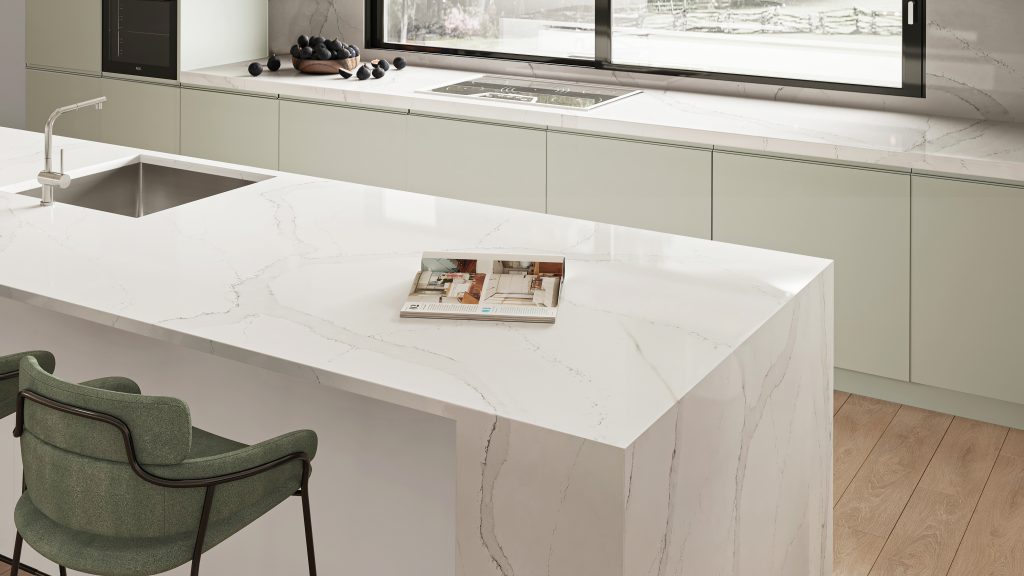
Longer warranty
Such is their confidence in the durability of quartz; manufacturers offer a generous, in many cases lifetime, warranty.
Cons of quartz countertops
Heat-resistance
Although quartz does offer a good degree of heat resistance, it doesn’t perform quite as well as granite when it comes to extreme heat. Placing hot pans directly on the surface of engineered quartz can result in burn marks and discoloration. But this is an easy problem to fix. What better excuse to accessorize your dream kitchen with trivets, mats, and boards that you can replace whenever you feel like a change of color palette or mood.
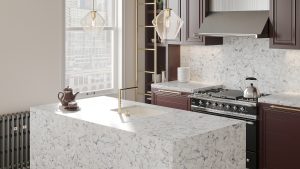
Quartz countertops cost
Materials and professional installation: $50 – $100 per square foot.
Maintenance costs: Low
Which kitchen countertop is best?
A countertop is likely to be the centerpiece of your kitchen and an area where people come together, eat, talk and create memories. There’s pressure to get it right in so many ways – aesthetics, functionality, longevity, and cost. While all types of countertop have their pros and cons, it’s quartz that brings the most benefits to the table.
Whether you’re adding a hint of nature to a bright, airy breakfasting area or a striking statement to a sleek, contemporary bathroom, quartz gives you creative freedom. And if you’re still attached to the idea of a natural stone surface, you can replicate the effect with quartz. Once it’s in place, it will stand up to the spills and splashes of family life for years to come.
Buying any natural or engineered stone countertop is a financial investment, but quartz brings the added value of being more customizable, lower maintenance, and easier to repair than its granite and marble rivals.
You may also like
Sign Up For Our Newsletter
Subscribe to our newsletter to stay updated with the latest News, Case Studies etc.
[mc4wp_form id="779"]







